James Henry Dawkins
b. October 24th, 1936 in Tchula (Mississippi)
d. April 10th, 2013 in Chicago (Illinois)
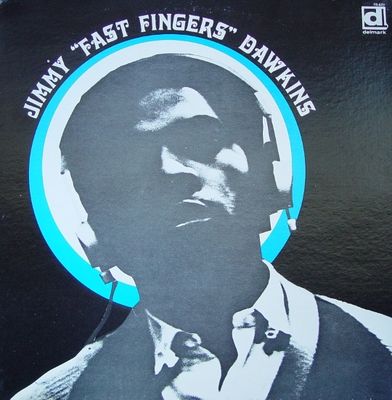
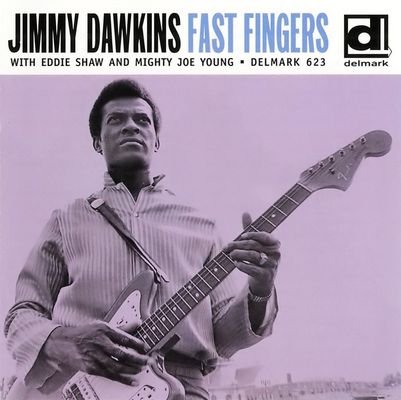
FAST FINGERS
Delmark
ELECTRIC BLUES CHICAGO STYLE vol.4
Goody
November 1968 - January 1969
Né à Tchula en plein coeur du Mississippi, Jimmy grandit à Pescagoula. Il ne commence à jouer de la guitare qu'à l'adolescence. Arrivé à Chicago en 1955, il partage son temps entre son travail à l'usine et la musique dans les clubs de la Windy City : The Pink Poodle, The Big Squeeze Club, Alice's Revisited, The Copa Cabana. Dans les rues de la ville, il joue derrière Lester Hinton. Sa réputation grandit rapidement et sa rencontre décisive avec Willie Dixon lui permet de s'intégrer à la scène bourgeonnante du West Side. Il a prétendu avoir enregistré pour King / Federal vers 1960. Mais, nulle trace de ces morceaux n'a jamais été trouvé. En tant que sideman, Jimmy joue derrière Little Mack Simmons (vers 1961). Il participe aussi aux albums de "Sleepy" John Estes ("Electric sleep") et surtout de Johnny Young ("Johnny Young & Big Walter") qui le fait remarquer. Grâce aux efforts de son ami Magic Sam, il peut rencontrer Robert Koester - le patron de Delmark - qui lui propose de graver son premier disque en studio. Après une quinzaine d'années d'apprentissage du Blues, Jimmy trouve donc l'opportunité de démarrer une carrière en leader. Accompagné par des musiciens exceptionnels (Eddie Shaw, Lafayette Leake, "Mighty" Joe Young, Joe Harper, Ernest Gatewood, Lester Dorsie), il livre un album essentiel du post-West Side Sound. Chanteur convaincant mais surtout guitariste cinglant et expressif, il crée son propre son dans la lignée de celui de son mentor Magic Sam : un Blues électrique écorché souvent pessimiste et torturé. Tous les titres sont remarquables : "It serves me right to suffer", "I wonder why", "Triple trebles", "Night rock", "I don't know what love is", "Breaking down". Avec le succès de ce premier album, "Fast fingers" deviendra parfois le surnom de Jimmy (un surnom qu'il n'aime pas).
Born in Tchula in the heart of Mississippi, Jimmy grows up in Pescagoula. He began playing guitar as a teenager. Arriving in Chicago in 1955, he shared his time between his work in a factory and music in Windy City clubs : The Pink Poodle, The Big Squeeze Club, Alice's Revisited, The Copa Cabana. In the streets of the city, he plays behind Lester Hinton. His reputation grew rapidly and his decisive meeting with Willie Dixon allows him to integrate the West Side burgeoning scene. He claimed to have recorded for King / Federal around 1960. But no trace of these tapes has never been found. As a sideman, Jimmy plays behind Little Mack Simmons (circa 1961). He also participates in the albums of "Sleepy" John Estes ("Electric sleep") and especially Johnny Young ("Johnny Young & Big Walter") that attract attention to him. Thanks to the efforts of his friend Magic Sam, he can meet Robert Koester - Delmark boss - who invited him to cut his first studio album. After fifteen years of learning Blues, Jimmy finds the opportunity to start a career as a leader. Accompanied by exceptional musicians (Eddie Shaw, Lafayette Leake, "Mighty" Joe Young, Joe Harper, Ernest Gatewood, Lester Dorsie), he delivers an essential post-West Side Sound album. Convincing singer but above all sharp and expressive guitarist, he created his own sound in line with that of his mentor Magic Sam : a tormented electric blues often pessimistic and tortured. All titles are remarkable : "It serves me right to suffer", "I wonder why", "Triple trebles", "Night rock", "I don't know what love is", "Breaking down". With the success of this first album, "Fast Fingers" sometimes become the nickname of Jimmy (a nickname he dislikes).
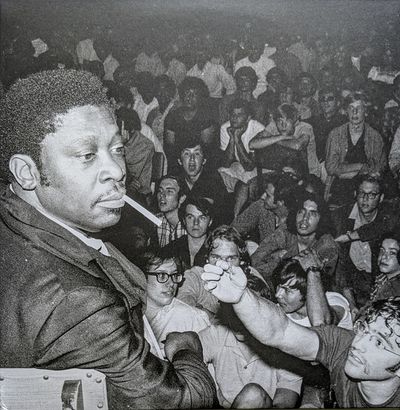
ANN ARBOR BLUES & JAZZ FESTIVAL 1969 vol.1
Third Man
August 1969
Malgré une qualité sonore moyenne (on entend mal le saxophone), on peut écouter ici "I wonder why" joué sur la scène du célèbre festival d'Ann Arbor.
Despite an average sound quality (you can hardly hear the saxophone), you can listen here to "I wonder why" played on the stage of the famous Ann Arbor festival.
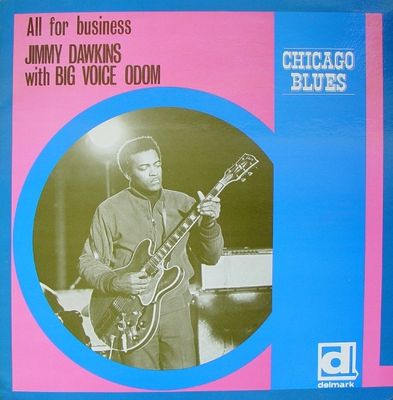
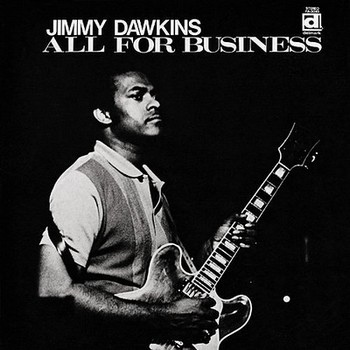
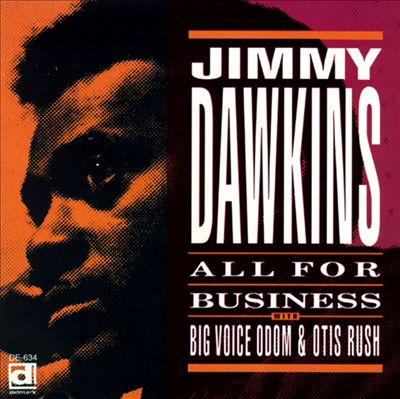
ALL FOR BUSINESS
Delmark
October - November 1971
Poursuivant son activité de sideman apprécié, Jimmy participe à plusieurs disques importants de Luther Allison ("Love me mama"), Carey Bell ("Carey Bell's blues harp"), George "Wild Child" Butler ("Keep on doin' what you're doin'"), "Mighty" Joe Young ("Blues with a touch of soul") et Hubert Sumlin ("King of Chicago blues vol.2"). Pour ce second disque pour Delmark, il se concentre sur la guitare laissant la plupart des parties chantées à Andrew "Big Voice" Odom (pas toujours convaincant malheureusement). Le saxophone de Jim Conley et l'orgue de Sonny Thompson apportent beaucoup au son et à la cohésion de l'ensemble. Il faut noter aussi qu'Otis Rush - un ami de Jimmy - tient la guitare rythmique (et parfois solo). Un magnifique morceau-titre ouvre l'album ("All for business") puis le funky "Having such a hard time", le slow blues "Born in poverty", le sublime duel de guitare avec Otis Rush ("Cotton country") figurent parmi les grandes réussites de cet excellent album. Malgré cela, "All for business" apparait tout de même moins intense que "Fast fingers". Avec la version CD, trois titres supplémentaires furent ajoutés (dont le long instrumental "Jammin' with Otis" et l'accrocheur "Hippies playground").
Continuing his estimated sideman activity, Jimmy participated in several important records of Luther Allison ("Love me mama"), Carey Bell ("Carey Bell's blues harp"), George "Wild Child" Butler ("Keep on doin' what you're doin'"), "Mighty" Joe Young ("Blues with a touch of soul") and Hubert Sumlin ("King of Chicago blues vol.2"). For this second album for Delmark, he focuses on the guitar leaving most of the sung parts to Andrew "Big Voice" Odom (not always convincing unfortunately). Saxophonist Jim Conley and organist Sonny Thompson bring a lot to the sound and cohesion of the whole record. Note also that Otis Rush - a friend of Jimmy - holds the rhythm guitar (and sometimes solo guitar). A beautiful title track opens the album ("All for business") and the funky "Having such a hard time", the slow blues "Born in poverty", the sublime guitar duel with Otis Rush ("Cotton country") are among the major achievements of this great album. Despite this, "All for business" appears still less intense than "Fast fingers". With the CD version, three additional titles were added (with the long instrumental "Jammin' with Otis" and the catchy "Hippies playground").
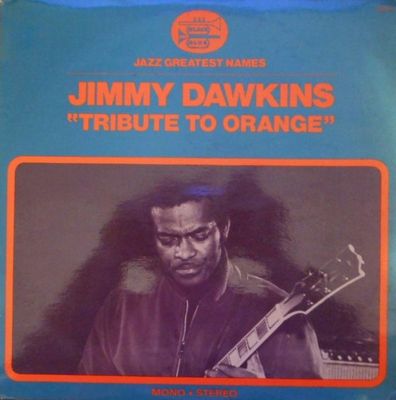
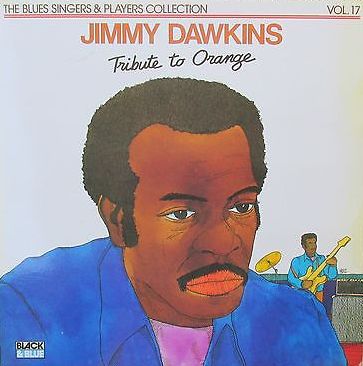
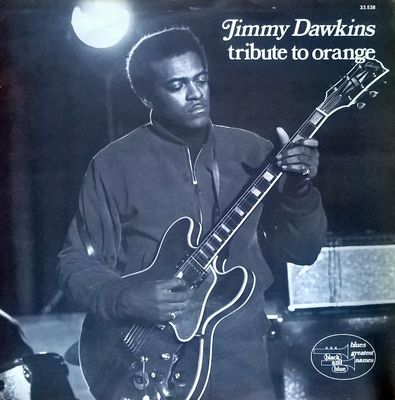
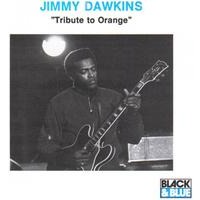
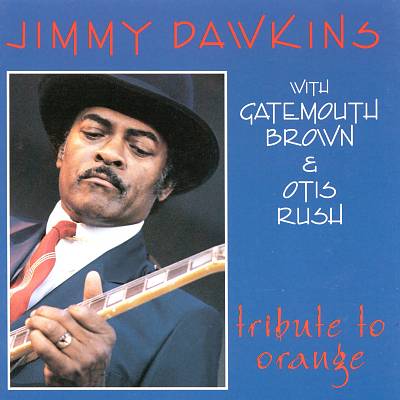
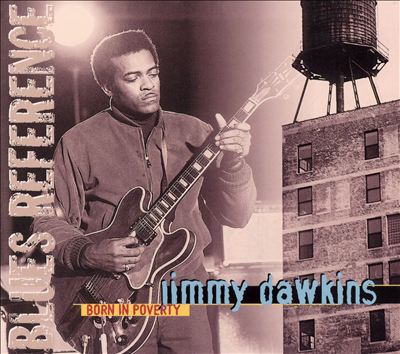
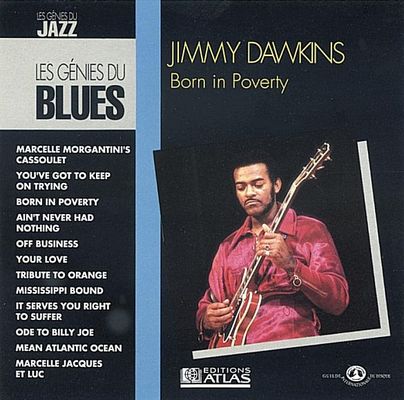
TRIBUTE TO ORANGE
Black & Blue
Evidence
BORN IN POVERTY
Black & Blue
Atlas
November - December 1971
Pendant la tournée du Chicago Blues Festival organisée par Jean Marie Monestier sur le sol français, Jimmy joue notamment en compagnie de Cousin Joe et Clarence "Gatemouth" Brown. Sur disque, le groupe manque cruellement de cohésion (Cousin Joe est souvent bien peu inspiré). Un ensemble assez désordonné souvent ennuyeux constituant au final un disque franchement décevant (certaines pistes sont d'un ennui total). Il est curieux de constater que lors de cette tournée, les mêmes musiciens donneront leur meilleur pour le "Bad luck blues" de Cousin Joe. Ce microsillon a été repris et augmenté par Black & Blue mais également par le label américain Evidence.
During the Chicago Blues Festival tour organized by Jean Marie Monestier on French ground, Jimmy played alongside Cousin Joe and Clarence "Gatemouth" Brown. On record, the band sorely lacking cohesion (Cousin Joe is often uninspired). A disorganized and often boring content finally constituting a really disappointing album (some tracks are a total boredom). It is curious to note that during this tour, the same musicians will give their best for the "Bad luck blues" of Cousin Joe. This LP was reissued and enhanced by Black & Blue but also by the american label Evidence.
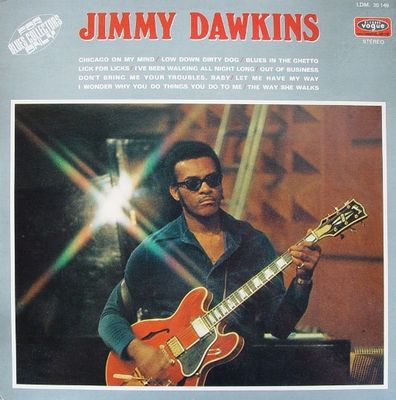
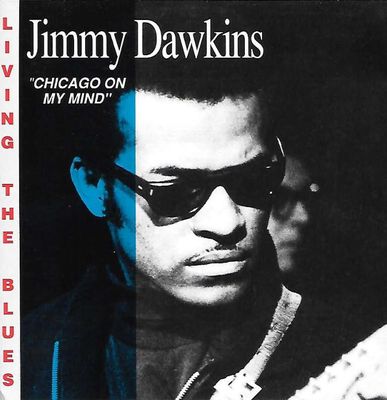
JIMMY DAWKINS
Vogue
CHICAGO ON MY MIND
Vogue
June 1972
Gravé à Paris lors d'une de ses venues en Europe, quelques jours avant d'apparaitre au prestigieux festival de Montreux, ce disque présente Jimmy en leader d'un groupe de musiciens français (Georges Arvanitas, Jacky Sanson, Michel Denis) et de Mickey Baker (qui vivait en France depuis plusieurs années). "Don't bring me your troubles baby", "Low down dirty dog", "I've been walking all night long" et l'instrumental "Blues in the ghetto" apparaissent comme les meilleurs moments de ce disque sympathique.
Recorded in Paris during one of his visits to Europe, a few days before appearing at the prestigious Montreux Festival, this disc presents Jimmy as a leader of a french musicians band (Georges Arvanitas Jacky Sanson, Michel Denis) and Mickey Baker (who lived in France for several years). "Don't bring me your troubles baby", "Low down dirty dog", "I've been walking all night long" and the instrumental "Blues in the ghetto" appear as the highlights of this nice record.
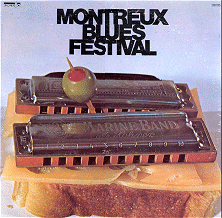
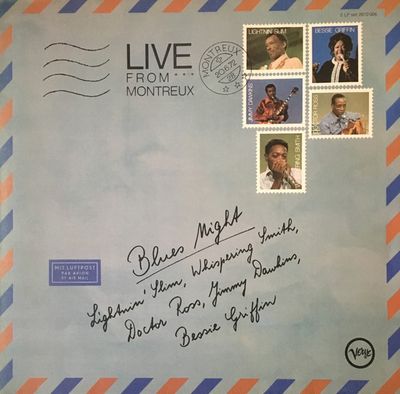
MONTREUX BLUES FESTIVAL
Excello
Sonet
LIVE FROM MONTREUX
Verve
June 1972
A l'affiche du fameux festival de Montreux en Suisse, Jimmy est bien accompagné par les Aces (Louis & Dave Myers, Fred Below) ainsi que Lafayette Leake. Sa prestation est à la hauteur de l'événement avec de remarquables lectures de "Five long years", "Whole lotta lovin'", "I'm gonna move to the outskirts of town".
Featured at the famous Montreux Festival in Switzerland, Jimmy is accompanied by The Aces (Louis & Dave Myers, Fred Below) and Lafayette Leake. His performance is at the height of the event with remarkable readings of "Five long years", "Whole lotta lovin'", "I'm gonna move to the outskirts of town".
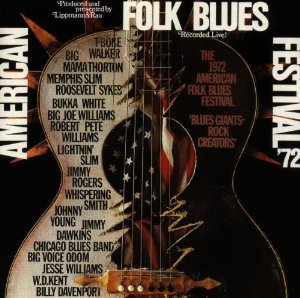
AMERICAN FOLK BLUES FESTIVAL '72
Atlantic
L+R
October 1972
A nouveau associé à Andrew "Big Voice" Odom, Jimmy prend part à la tournée de l'American Folk Blues Festival en 1972 en Europe. Dans cet album, les deux bluesmen sont représentés par deux bons morceaux.
Associated with Andrew "Big Voice" Odom, Jimmy takes part in the American Folk Blues Festival tour in 1972 in Europe. In this album, the two bluesmen are represented by two good tracks.
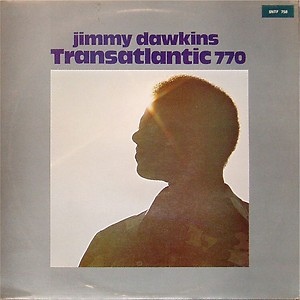
TRANSATLANTIC 770
Excello
Polydor
Sonet
1972
En 1972, Jimmy signe - de manière inattendue - chez Excello et grave cet album à Londres. Entouré d'une quinzaine de musiciens et du producteur Mike Vernon, Jimmy est noyé dans des arrangements peu subtils mêlant sections cuivres et éléments soul-funk pas toujours pertinents et souvent confus. Quelques moments intéressants toutefois ("Things I used to do", "Stoned dead") peuvent être signalés mais d'autres s'avèrent vraiment ratés ("1011 Woodland", "High cost of living").
In 1972, Jimmy sign up - unexpectedly - with Excello and cut this album in London. Surrounded by fifteen musicians and producer Mike Vernon, Jimmy is drowned in less subtle arrangements combining horn sections and not always relevant and often confused soul-funk elements. However, some interesting moments ("Things I used to do", "Stoned dead") can be pointed out, but others turn out really unsuccessful ("1011 Woodland", "High cost of living").
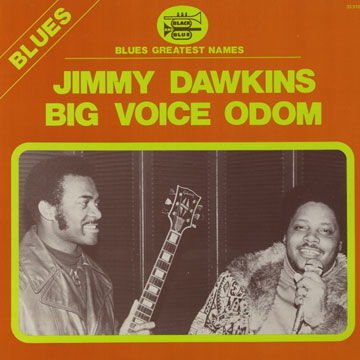


JIMMY DAWKINS / BIG VOICE ODOM
Black & Blue
TRIBUTE TO ORANGE
Evidence
BORN IN POVERTY
Black & Blue
November 1974
Deuxième album pour Black & Blue à l'occasion, une fois encore, d'une tournée du Chicago Blues Festival, il fut gravé le même jour que "Screamin' and cryin'" d'Otis Rush et "Worried about my baby" de Sunnyland Slim. Jimmy et Andrew "Big Voice" Odom se partagent les parties chantées. Du Blues très classique pas forcément très original, parfois ennuyeux.
Second album for Black & Blue during, once again, a Chicago Blues Festival tour, it was engraved the same day as Otis Rush's "Screamin' and cryin'" and Sunnyland Slim's "Worried about my baby". Jimmy and Andrew "Big Voice" Odom share the sung parts. Classic blues, not necessarily very original, sometimes boring.
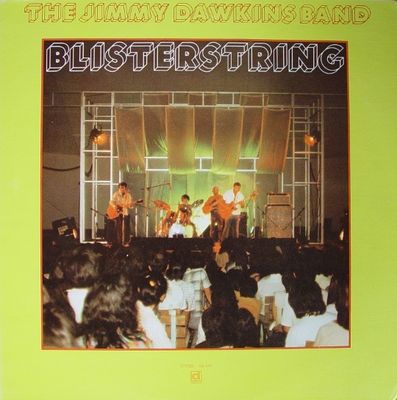
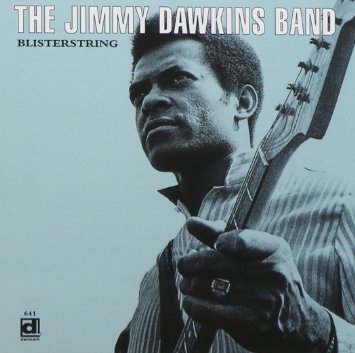
BLISTERSTRING
Delmark
May - June 1975
Ces séances furent réalisées grâce au concours du producteur Steve Tomashefsky (également manager de Jimmy Dawkins) qui revendit ensuite les bandes à Delmark (firme pour laquelle il travaillait) après avoir convaincu Robert Koester de les éditer. Pour Jimmy, il s'agissait d'un retour chez Delmark pour le meilleur après plusieurs albums européens inégaux. Remarquablement accompagné par Jimmy Johnson, Sonny Thompson, Sylvester Boines et Tyrone Centuray, il use ici d'un son de guitare souvent distordu et incisif, plus en avant que d'habitude. Le torturé "Feel so bad", "Blue monday" et ses accents Nouvelle Orléans, le puissant "If you're ready", le soul-blues "Welfare line" enfin l'excellent "Shufflin' the blues" (titre additionnel de la version CD) méritent absolument une écoute attentive. Il s'agit du dernier album enregistré dans les mythiques studios Chess (Ter-Mar Studios).
These sessions were conducted with the assistance of producer Steve Tomashefsky (also Jimmy Dawkins' manager) who then sold tapes to Delmark (firm for which he worked) after have convinced Robert Koester to issue them. For Jimmy, it was a come back at Delmark for the best after several uneven european albums. Remarkably accompanied by Jimmy Johnson, Sonny Thompson, Sylvester Boines and Tyrone Centuray, he uses here a distorted and often incisive guitar sound more on the foreground than usual. The tortured "Feel so bad", "Blue monday" with its New Orleans accents, the powerful "If you're ready", the soul-blues "Welfare line" and finally the excellent "Shufflin' the blues" (additional title of the CD version) absolutely deserve careful listening. This is the last album recorded at the legendary Chess studios (Ter-Mar Studios).
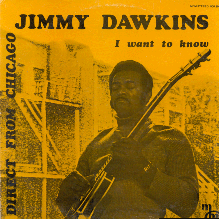
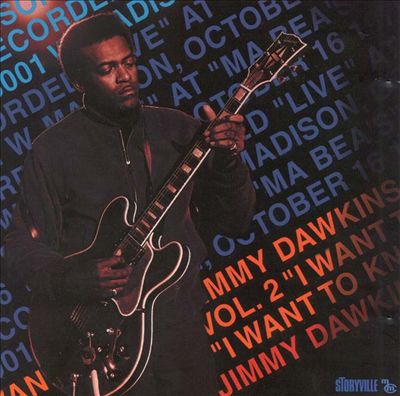
I WANT TO KNOW
MCM
Storyville
October 1975
Capturé au Ma Bea's - un club de Chicago - par la française Marcelle Morgantini, Jimmy Dawkins est accompagné par son groupe régulier (quasiment le même que dans "Blisterstring"). On déplore quelques longueurs sur certains titres mais globalement il s'agit d'un album live très intéressant. Edité d'abord sur MCM (Marcelle Chailleux Morgantini), il fut réédité par Storyville en CD.
Captured at Ma Bea's - a club in Chicago - by the french Marcelle Morgantini, Jimmy Dawkins is accompanied by his regular group (almost the same as in "Blisterstring"). We deplore a few lengths on some songs but overall this is a very interesting live album. First issued on MCM (Marcelle Chailleux Morgantini), it was reissued by Storyville on CD.
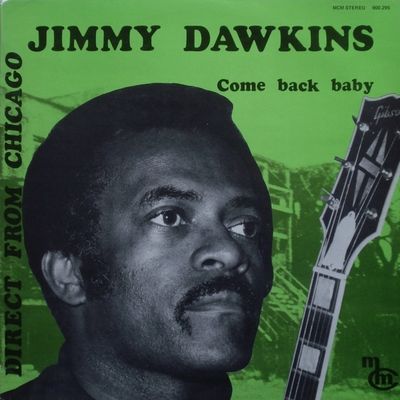
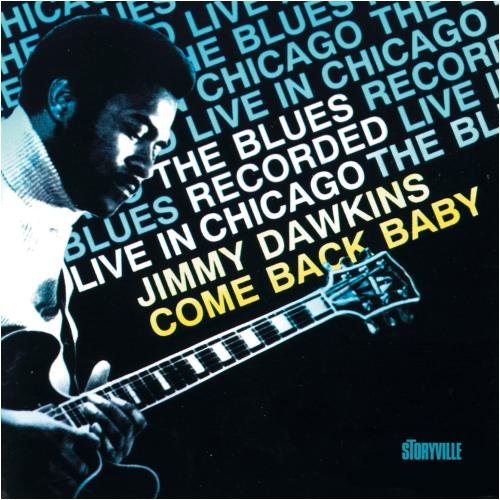
COME BACK BABY
MCM
Storyville
November 1976
Enregistré cette fois au club Big Duke's de Chicago par Marcelle Morgantini, il s'agit d'une nouvelle captation scénique de Jimmy Dawkins. Son groupe est composé de Richard Kirch, Sylvester Boines et Tyrone Centuray. Pas foncièrement original mais plaisant. "Crossroads blues", "Big Duke's", "Hard road to travel" figurent parmi les meilleurs passages du disque.
Recorded this time at Big Duke's Club in Chicago by Marcelle Morgantini, this is a new scenic capture of Jimmy Dawkins. His band consists of Richard Kirch, Sylvester Boines and Tyrone Centuray. Not fundamentally original but pleasant. "Crossroads blues", "Big Duke's", "Hard road to travel" are among the best parts of the disc.
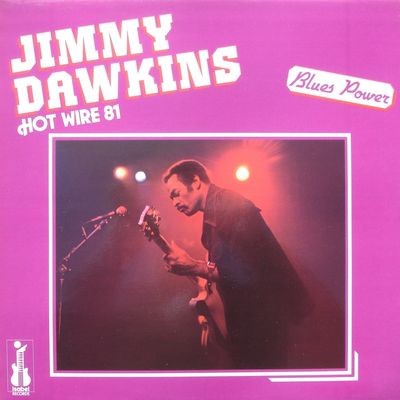
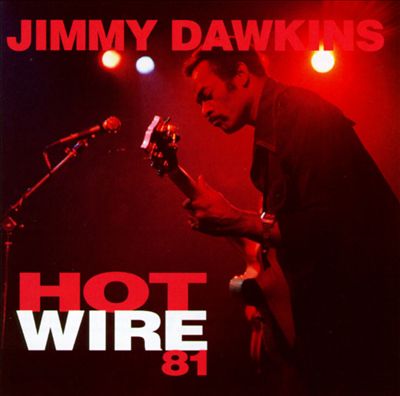
HOT WIRE 81
Isabel
Evidence
March 1981
Entre 1976 et 1981, Jimmy Dawkins n'enregistre rien à part une participation extrêmement discrète à l'American Blues Legends de 1979. D'après les notes de pochette de Steven Sharp (sur la réédition CD d'Evidence), ce "Hot wire 81" serait le disque préféré de Jimmy Dawkins. Une séance française sans répétition, très spontanée et parfaitement produite par Didier Tricard. Le groupe - d'une grande cohésion - est composé de Rich Kirch (guitare), Sylvester Boines (basse) et James Schutte (batterie). Après des années d'absence discographique, Jimmy lui étincelle à la guitare tout au long du disque. Quelques pépites se rangent aisément dans ses toutes meilleures réussites doivent absolument être écoutéés : "You just a baby child", "Welfare line", "Ruff times", "Pepper's music". Un superbe album qui mériterait d'être mieux connu.
Between 1976 and 1981, Jimmy Dawkins does not record anything except an extremely discreet participation in the 1979 American Blues Legends tour. According to the liner notes of Steven Sharp (on the Evidence CD reissue), this "Hot wire 81" would be the preferred album of Jimmy Dawkins. A french session without rehearsal, very spontaneous and perfectly produced by Didier Tricard. The backing band - really consistent - is composed of Rich Kirch (guitar), Sylvester Boines (bass) and James Schutte (drums). After years of discographical absence, Jimmy shines on guitar throughout the disc. Some gems, easily ranging with all his best achievements, must absolutely be heard : "You just a baby child", "Welfare line", "Ruff times", "Pepper's music". A superb album that deserves to be better known.
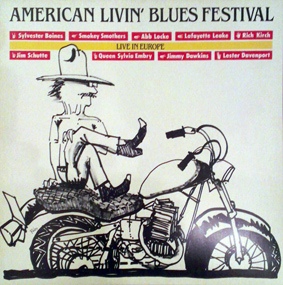
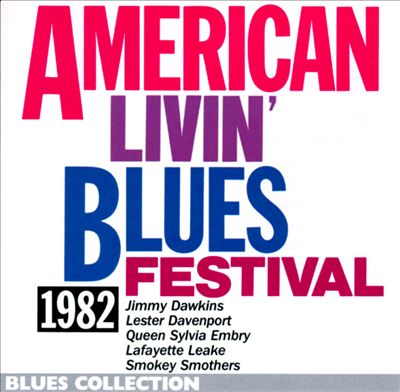
AMERICAN LIVIN' BLUES FESTIVAL
Paris Album
EPM
May 1982
Dans ce concert enregistré en région parisienne, Jimmy joue "Don't cha wanna know" et "Feel so bad" de belle manière accompagné de son groupe régulier.
In this concert recorded in Paris suburbs, Jimmy plays "Don't cha wanna know" and "Feel so bad" in a fine style with his regular group.
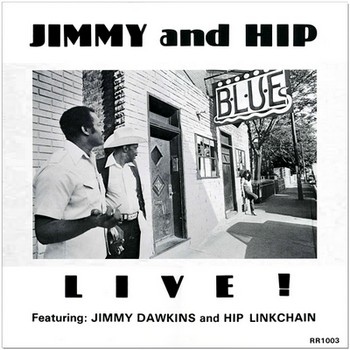
JIMMY AND HIP : LIVE
Rumble
October 1982
Capté sur scène à Champaign (Illinois) en compagnie d'Hip Linkchain, Jimmy prend trois titres en leader dont le puissant "Sounds of West Side Chicago" et des reprises peu convaincantes de "Little red rooster" et "Boogie chillun".
Captured on stage in Champaign (Illinois) in the company of Hip Linkchain, Jimmy takes three titles as a leader, notably the powerful "Sounds of West Side Chicago" and unconvincing covers of "Little red rooster" and "Boogie chillun".
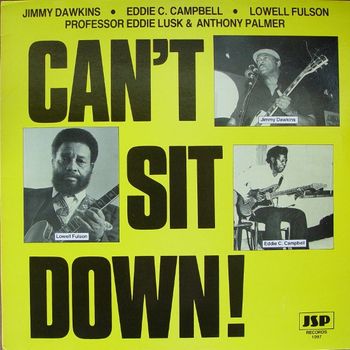
CAN'T SIT DOWN
JSP
1984
Après avoir accompagné sa protégée Queen Sylvia Embry en 1983 sur son album "Midnight baby", Jimmy passe chez JSP, un label anglais. Dans cette anthologie, on trouve deux de ses morceaux : "So good to me", un duo avec Nora Jean Wallace aux arrangements soul-funk pas vraiment aboutis et l'ennuyeux "We got to go". Ces deux pistes sont reprises dans la version CD de "Feel the blues".
After accompanying his protege Queen Sylvia Embry in 1983 on his album "Midnight baby", Jimmy goes to JSP, an english label. In this anthology, there are two of his songs : "So good to me", a duet with Nora Jean Wallace with not really successful soul-funk arrangements and the boring "We got to go". These two tracks are included in the CD version of "Feel the blues".
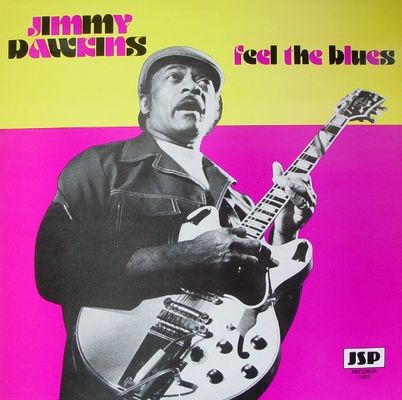
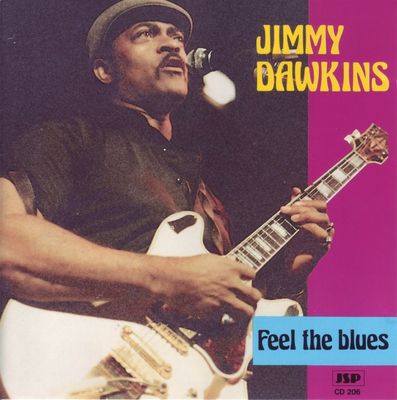
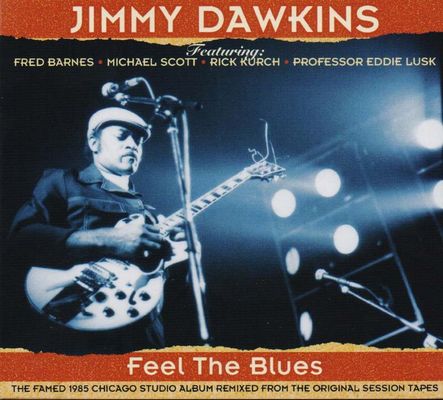
FEEL THE BLUES
JSP
1984
En 1984, Jimmy signe chez JSP, le label anglais de John Stedman. Pour cet album fréquemment sous-estimé, produit par Dawkins lui-même, on tente de mêler des éléments Pop, Soul et Funk (la chanson titre "Feel the blues") pas toujours convaincants. Quelques titres surnagent et méritent l'écoute comme "If you got to love somebody" et "Last days" mais globalement la musique reste inégale. Les bandes initiales seront remixées en 1997 (avec un résultat artistique plutôt positif). On note la participation de la chanteuse Nora Jean Wallace sur un morceau.
In 1984, Jimmy sign up at JSP, the english label of John Stedman. For this album, frequently underestimated, produced by Dawkins himself, they attempt to mix not always convincing Pop, Soul and Funk elements (the title song "Feel the blues"). Some titles are worth listening as "If you got to love somebody" and "Last days" but overall the music is uneven. The initial tapes will be remixed in 1997 (with a rather positive artistic result). We note the participation of the singer Nora Jean Wallace on a track.
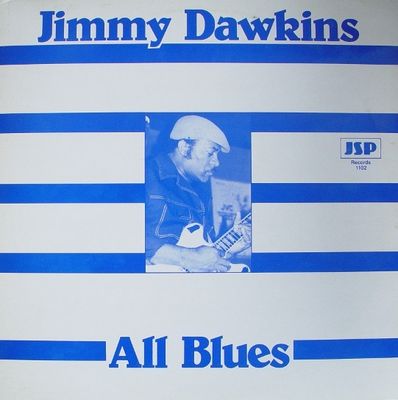
ALL BLUES
JSP
May 1985
Concert au 100 Club de Londres édité par le label anglais JSP. Comme d'habitude, la guitare est en avant et prend presque toute la place sur des morceaux dépassant volontiers les 5 minutes. C'est néanmoins un album live correct mais mineur dans l'imposante discographie de Jimmy, à conseiller avant tout aux fans confirmés.
Concert at the 100 Club in London issued by the english label JSP. As usual, the guitar is in front and takes up almost all the space on tracks exceeding gladly the 5 minutes. It is nevertheless a decent but minor live album in the imposing discography of Jimmy, to advise above all to confirmed fans.
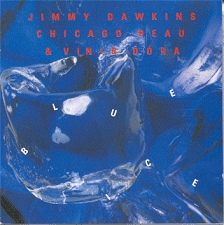
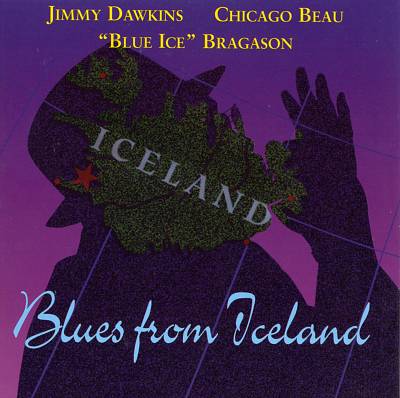
BLUE ICE
Platonic
BLUES FROM ICELAND
Evidence
April 1991
De passage en Islande, Jimmy enregistre ce disque en public en compagnie du chanteur Chicago Beau et d'un groupe islandais plutôt compétent. La prestation s'avère relativement correcte quoique pas très originale.
While in Iceland, Jimmy records this live album alongside singer Chicago Beau and a rather competent icelandic group. The prestation appears fairly good although not very original.
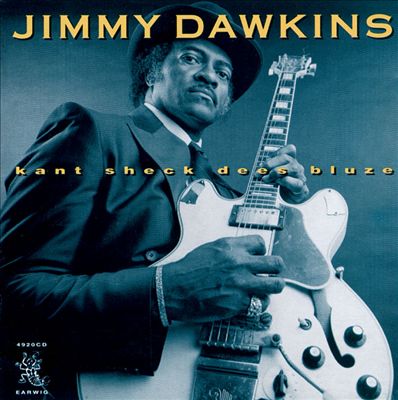
KANT SHECK DEES BLUZE
Earwig
June 1991
Jimmy n'avait rien enregistré en studio depuis les séances JSP de 1984. Pendant ce temps, il s'est occupé de son propre label Leric et a produit Nora Jean Wallace (Nora Jean Bruso), Little Johnny Christian, Vance Kelly, Tail Dragger (alias James Yancey Jones), Queen Sylvia Embry. Il a continué aussi, çà et là, son activité de sideman en accompagnant Shirley King ("Jump through my keyhole"). Ce nouvel album, gravé en quelques heures, fut donc une sorte d'album de retour. Produit par Jimmy lui-même, il compte la participation d'un groupe puissant composé du Professor Eddie Lisk (claviers), Billy Flynn (guitare), Johnny B. Gayden (basse) et de Ray Scott (batterie). Il n'avait plus livré un album aussi consistant depuis "Hot wire 81". Le son est compact et puissant. Plusieurs grands moments émaillent ce disque : "I ain't got it", "A love like that" (en duo avec Nora Jean Wallace), "Kant sheck dees bluze" (meilleur titre de l'album), "Gittar rapp" (duel de guitares entre Dawkins et Billy Flynn), "Get on the ball", "Luv somebody".
Jimmy was not recorded in studio since JSP sessions in 1984. During this time, he took care of his own Leric label and has produced Nora Jean Wallace (Nora Jean Bruso), Little Johnny Christian, Vance Kelly, Tail Dragger (aka James Yancey Jones), Queen Sylvia Embry. He also continued here and there, his sideman activity accompanying Shirley King ("Jump through my keyhole"). This new album, recorded in a few hours, was therefore a kind of comeback album. Produced by Jimmy himself, it has the participation of a powerful band composed of Professor Eddie Lisk (keyboards), Billy Flynn (guitar), Johnny B. Gayden (bass) and Ray Scott (drums). He no longer delivers such a consistent album since "Hot wire 81". The sound is compact and powerful. Several highlights punctuate this disc : "I ain't got it," "A love like that" (a duet with Nora Jean Wallace), "Kant sheck dees bluze" (the best title of the album), "Gittar rapp" (guitar duel between Dawkins and Billy Flynn), "Get on the ball", "Luv somebody".
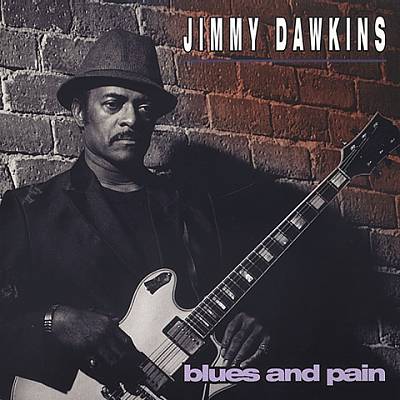
BLUES AND PAIN
Ichiban
Winter 1994
Il s'agit de son premier album pour Ichiban (et sa marque Wild Dog), un label fondé par John Abbey et Nina Easton. Ici, le son devient nettement Soul-Blues. Cet excellent opus est constellé de superbes réussites : "Right to quit you", le remarquable "Lonely guitar man", "Fool in heah" (magnifique incursion country-blues), le cinglant instrumental "Gitar jive".
This is his first album for Ichiban (and its Wild Dog imprint), a label founded by John Abbey and Nina Easton. Here, the sound is noticeably Soul-Blues. This excellent opus is full of stunning success : "Right to quit you", the remarkable "Lonely guitar man," "Fool in heah" (beautiful country-blues incursion), the incisive instrumental "Gitar jive".
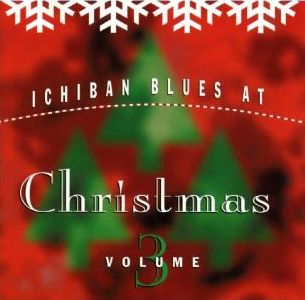
ICHIBAN BLUES AT CHRISTMAS vol.3
Ichiban
1994
Pour cette anthologie de Noël, Jimmy joue un sympathique "Christmastime blues".
In this Christmas anthology, Jimmy plays a nice "Christmastime blues".
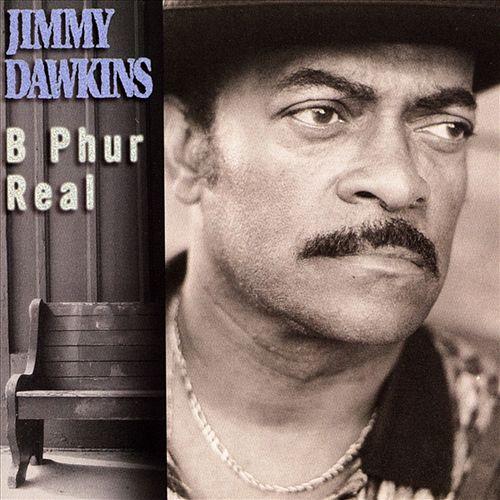
B PHUR REAL
Ichiban
March - April 1995
Second disque pour Ichiban - Wild Dog dont la production est assumée par Bryan Cole et Edd Miller. Il s'avère intéressant mais beaucoup moins percutant et original que "Blues and pain". Certains titres sont un peu longs et auraient mérités d'être écourtés.
Second installment for Ichiban - Wild Dog, the production is performed by Bryan Cole and Edd Miller. It is interesting but far less powerful and original as "Blues and pain". Some titles are a bit long and would have deserved to be shortened.
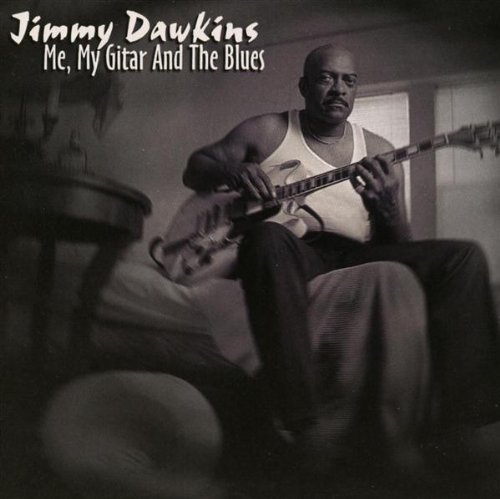
ME MY GITAR AND THE BLUES
Ichiban
May 1997
Troisième et dernier opus pour la firme d'Atlanta Ichiban (avec les mêmes producteurs Bryan Cole et Edd Miller). Le puissant et lourd "Back to school" mais aussi "Tuff girl", "Me my guitar and the blues" sortent du lot. Cependant, le reste du programme mérite l'écoute. Apparemment, son contrat avec Ichiban prévoyait un quatrième album mais celui-ci n'a jamais vu le jour.
Third and final installment to the Atlanta-based label Ichiban (with the same producers Bryan Cole and Edd Miller). The powerful and heavy "Back to school" but also "Tuff girl", "Me my guitar and the blues" stand out. However, the remaining of the program deserve listening. Apparently, his contract with Ichiban seemed to forecast a fourth album but it has never seen the light of the day.
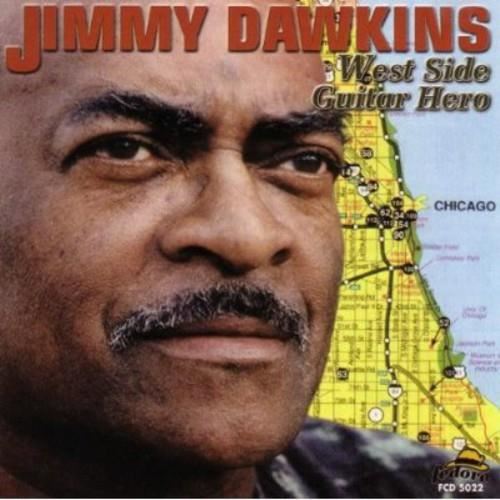
WEST SIDE GUITAR HERO
Fedora
October 2001
Arrivé sur le label californien Fedora sous la supervision du batteur - producteur Chris Millar, Jimmy se montre toujours en forme parfaitement soutenu par un groupe très homogène : Frank Goldwasser (guitare), John Suhr (orgue), Henry Oden (basse) et Chris Millar (batterie).
Arrived on the california-based label Fedora under the supervision of the drummer - producer Chris Millar, Jimmy is always in fine form perfectly supported by a very homogeneous group : Frank Goldwasser (guitar), John Suhr (organ), Henry Oden (bass) and Chris Millar (drums).
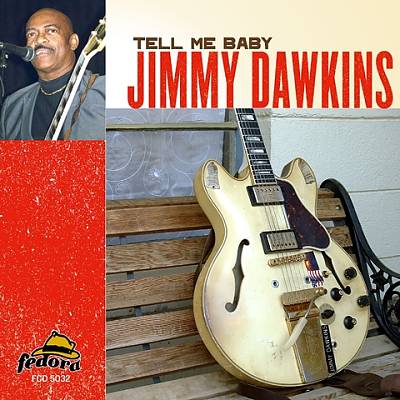
TELL ME BABY
Fedora
July 2003
Sur ce deuxième disque pour Fedora, Jimmy est entouré de la même équipe que sur "West side guitar hero" ou presque. Il retrouve aussi son vieil ami guitariste Rich Kirch qui l'avait accompagné dans les années 70 et 80. La musique s'avère puissante, inspirée et enthousiasmante comme sur "Tell me baby", "Kotten field jump", "Mean ol' blues", "Tired of krying".
On this second album for Fedora, Jimmy is surrounded by almost the same team as "West Side guitar hero". He also found again his old friend guitarist Rich Kirch who had accompanied him in the 70's and 80's. Music is powerful and inspired especially on "Tell me baby", "Kotten field jump", "Mean ol' blues", "Tired of krying".